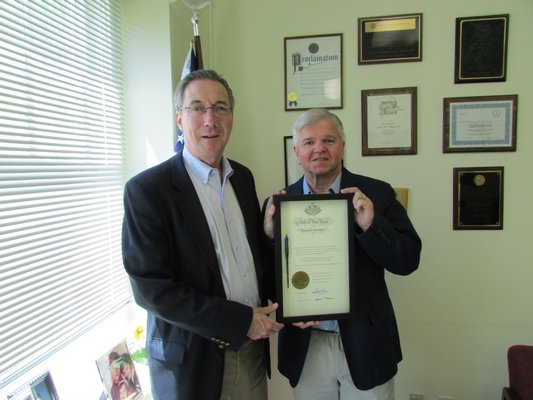
The Suffolk County Water Authority now has the power to convert unpaid water bills, which have traditionally been subsidized via upticks in water rates, into liens on property tax bills, potentially saving ratepayers hundreds of thousands of dollars.
This shift in authority was instated by legislation sponsored by Assemblyman Fred Thiele and State Senator Thomas D. Croci and signed into law by Governor Andrew Cuomo in October.
“I think it is a reasonable option for them to have,” Mr. Thiele, of Sag Harbor, said this week. “I think it’s best certainly for the ratepayers overall. There is nothing novel about it; water districts, other special districts and at least one other water authority in the state already had the ability to do it.”
As a public-benefit corporation, the SCWA, which serves roughly 1.2 million Suffolk County residents, does not have the taxation authority that municipal water districts enjoy. This legislation offsets that jurisdictional crutch, allowing the SCWA to place customer balances as liens on property taxes.
Previously, any outstanding water bills would fall by the wayside if a business or an individual sold their property. The SCWA’s only recourse was to take debtors to court, a pricey proposition, or to shut off the debtor’s water.
“That’s something we really don’t like to do and we take into consideration people have difficult times,” James Gaughran, the chairman of the SCWA, said. “However, I can’t tell you the percentage, but an awful lot of people who skip out on paying their water bill are people that are almost scamming us. People change corporate names, or people will just sell their property to a new owner and not pay the bill and we can’t tell the new owner, ‘Oh, you’re stuck with this bill.’”
Now, unpaid water bills with be attached as liens to the debtor’s property tax bills. As such, any outstanding bills will appear on property title searches and must be satisfied before property can be sold.
The SCWA loses about $1.2 million annually to unpaid bills, Mr. Gaughran said. In order to compensate for these losses, the SCWA raises the rate of the cost of water.
“A lot of the businesses are just not paying their water bill,” Mr. Gaughran said. “So the result of that, often, is that the rest of our customer base will just have to make up for the difference in the rates. That’s why this legislation is very helpful to all of our paying customers because we no longer have this situation with people basically getting away with not paying their water bills.”
Despite being unsure of the exact amount that ratepayers will save, Mr. Gaughran estimates that between $300,000 and $400,000 will be shaved from SCWA’s 1.2 million dollar loss.
He credits this legislation with limiting this year’s rate increase to 4 percent.
“Had we not had this legislation, the increase would have been higher,” Mr. Gaughran said.
Although property tax liens impacted the setting of this year’s rates, they have not yet been officially implemented.
“We haven’t established any of these liens yet, but we’re in the process of implementing it,” Mr. Gaughran said. “My guess is we’re going to have a lot fewer people trying to skip out on their bills simply because they’re going to realize if they want to sell their property, it’s going to be something that they’re going to have to pay up.”